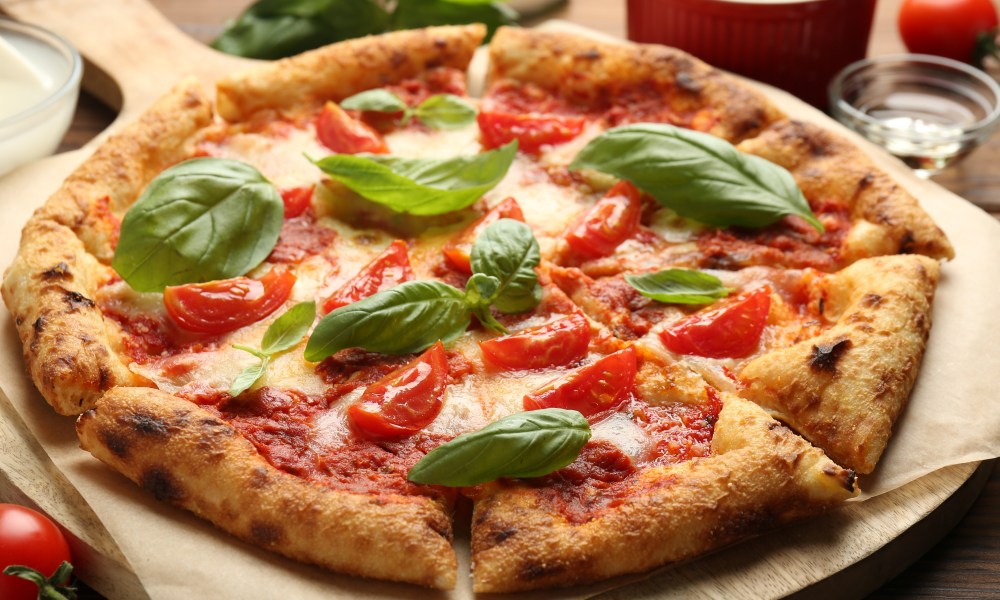Pizza is popular because it is quick, filling, and often considered a delicious comfort food. Even with so many people regularly eating pizza, its reputation remains mixed. So, is pizza bad for you, or is it one of the healthier convenience foods on the market?
There is no simple answer because it depends on various factors, such as toppings and how often someone eats pizza. With this in mind, let’s examine whether pizza is an unhealthy meal choice. If it is, can pizza be made healthier, and should anyone avoid it in their diet? Read on to discover everything you need to know about this famous dish.
Is all pizza unhealthy?

Not all pizza is unhealthy because it depends on the ingredients used during manufacturing. What kind of flour is used to make the dough and also the specific oils used make a big difference.
Then, there is the cheese and any other toppings to consider. An authentic vegetarian pizza made with unrefined flour and olive oil and packed with various vegetables instead of smoked meats is one example of how pizza can be healthy. If low-fat cheese is used as well, then the end product is even healthier.
On the other hand, pizza made with highly processed flour, vegetable oils, preservatives, high-fat cheese, and smoked meat toppings is at the opposite end of the health spectrum.
What nutrients does pizza have?

Again, pizza’s nutritional content depends on the ingredients that are used. Pizza contains carbohydrates from the dough base, fat, and protein from the oils and cheese, and sometimes sugar is added, too. However, vitamin and fiber content can increase or decrease.
Tomatoes contain antioxidants such as lycopene and are high in vitamin C, while vegetables can add further antioxidants, vitamins, and minerals to a pizza. Some vegetables also boost fiber content.
Cheese contains vitamin D and calcium, while meat toppings can increase the protein ratio. Meat-only pizza toppings tend to have fewer vitamins, minerals, and fiber than those that include vegetables.
Homemade vs. fast food vs. frozen pizza

Each type of pizza has its own set of health pros and cons. Homemade pizzas allow for greater control over ingredients, and only all-natural ingredients can be used if that’s what you desire. Fast food and frozen pizzas generally contain more processed and unhealthy ingredients such as extra salt, fat, additives, and preservatives.
High-quality flour and olive oil containing vitamin E and healthy monounsaturated fats can be used at home instead of the refined flour and cheap vegetable oils that often make up the bases of fast food and frozen pizza. In general, it’s a healthier meal if you make the pizza at home from scratch instead of going for take out.
How can you make pizza healthier?

Use whole wheat flour
Using whole wheat flour instead of highly processed white flour to make the pizza dough can add vitamins, minerals, and extra fiber to a pizza. It can also help prevent blood sugar spikes, particularly if the toppings are high in protein.
Whole wheat flour contains more complex carbohydrates than white flour. Because of its fiber content, whole wheat flour is digested slower, releasing energy gradually, preventing rapid blood sugar spikes.
Plant-based toppings
A quick way to turn a pizza into a healthy snack or main dish is to increase the plant-based ingredients added as toppings. Think red onions, broccoli, sweet corn, red peppers, and pineapple. All add various nutrients to a pizza, making it a healthier choice.
Lean protein
If you are watching your carb intake or want to make pizza more high-protein, opt for lean protein sources such as chicken and low-fat lean ham. Avoid processed meats that are high in fat, salt, and preservatives.
Pizza as a treat
If you are concerned that pizza is unhealthy or that the pizza you prefer is not the healthiest option, then limiting it to an occasional treat will prevent health impacts.
Frequently asked questions

Who should avoid pizza altogether?
People with gluten intolerance, lactose intolerance, celiac disease, or certain allergies may need to steer clear of traditional pizza. Additionally, those with specific dietary restrictions or health conditions such as diabetes should consult a medical professional or dietician if they have concerns.
Is it okay to have pizza once a week?
Pizza once a week is fine, especially if it is part of a balanced diet. Pizza can be a healthy food, depending on how it is made. Homemade pizza is best because you can control the ingredients and avoid food additives. You can also control sodium levels and exclude preservatives and other chemical ingredients.
Can you eat pizza and be healthy?
You can be healthy and eat pizza, especially if you add healthy ingredients such as vegetables. Eating various nutritious foods as part of a balanced diet and getting plenty of exercise also helps.
What is the healthiest pizza to eat?
A pizza with a whole wheat crust loaded with vegetables, lean proteins, and limited cheese is typically considered the healthiest option.




